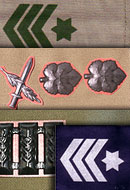Career Corps

The United States has its military academies at West Point and Annapolis. The British put their officers through Sandhurst. But how will the Israeli Defense Forces, a citizen army, train its officers for the 21st century? Last month, under the auspices of the Begin-Sadat Center for Strategic Studies and the IDF's Tactical Command College, several hundred IDF officers—scores of freshly-minted lieutenants plus a sprinkling of top brass—packed an auditorium at Bar Ilan University at Ramat Gan to hear ranking commanders and scholars address the question.
In contrast with the U.S. model, in which officers train at dedicated military instititutions and graduate with college degrees, IDF officers usually start their careers straight out of high school as conscripted privates. The road leading to a commission in the Israeli military typically begins when a private is identified as having leadership potential or some other skill and is invited to make a further commitment—the length varies—by enrolling in a course at the Haim Laskov Officer Candidate School near Mitzpe Ramon. Ground forces cadets pursue specializations such as armor, special forces, or logistics, while navy and air force enrollees undergo preparation in their own specialties. There are other training programs for elite units within the IDF, and a separate pre-recruitment selection system taps high school youths who are bound for elite volunteer units and may become officers.
But officer candidate training lasts less than six months. Officer cadets, no matter what their path to a commission, must go elsewhere for their undergraduate degrees. Those who want to move up the ladder of command must pursue further advanced academic and security credentials. While today's officer training is more structured than in Israel's early years, it remains fragmented. The Jewish state has never had the luxury of sending its officers off to years of uninterrupted military study.
It was notable, then, that the Bar Ilan gathering focused on military life as a profession and on the fundamental questions of officer training. What qualities should a fine officer possess? Does character still play a role on the 21st-century battlefield, where technological prowess can be more devastating than physical dexterity? How can officers better understand the politicians they need to advise?
Israeli generals addressed the first question. Major General Yair Golan, head of the Northern Command, a plain-spoken rising military star, said the qualities he looks for in an officer are creative thinking, meticulous planning, and the ability to instill morale through personal example. For Major General Sami Turgeman, IDF Ground Forces Commander, the key is an officer's competence in not just learning classroom doctrine but executing it under actual field conditions: "Even when you know what needs to be done, applying it is the hard part." He emphasized that good officers must be good builders: They know that they have to work 365 days a year to prepare their forces for war and that continuing military education is essential. Turgeman also offered a political corollary, announcing that he was intent on protecting the army's training budget from recently proposed austerity measures.
Professor Christopher Coker of the London School of Economics challenged the military audience to ask how waging war at computer consoles—for example, sending remotely-piloted drone aircraft on targeted killing missions—might affect their ethos as warriors. Cyber-warfare may remove soldiers from immediate danger, but they must struggle not to let technology diminish their humanity. The precision of machines cannot substitute for instilling values: Human behavior is invariably inconsistent and dependent on circumstances, so individual character-building and collective esprit de corps continue to matter. It was no accident, Coker noted, that in Iraq's Abu Ghraib prison, the well-trained, highly motivated U.S. Navy fighters refused to take part in ongoing prisoner abuse.
Professor Eliot Cohen of the School for Advanced International Studies at Johns Hopkins University said the officers had to consider the larger issue of military-civilian relations. Officers have to know how to give advice to politicians, but there is no straightforward training for the role; this is an expertise developed mostly through self-education. Cohen, who was Counselor to the U.S. State Department under Secretary of State Condoleezza Rice, noted that "advice is a dangerous gift even when given from the wise to the wise"—let alone when the advisor or advisee is not so wise. Wars, in particular, are constantly and rapidly evolving situations, in which officer-advisors need to ask themselves and others, "What are we trying to do?" "What are our priorities?" "Why do we think this will succeed?" "What else is happening in the political and security environment?" "How will we define victory?" Most of the time, they will not get satisfactory answers—which is precisely why they must ask the questions again and again.
Israel's 21st-century officer corps will have to live with all the issues raised at Bar Ilan—character, technology, politics, and more. A professional officer needs to muster the courage to disagree with his superiors—something that, paradoxically, may be easier within the military, especially in Israel, than when advising the political echelon. For the latter job, a good liberal arts education and overseas experience are essential. And those who understand a political organization's subculture, in the White House or the Prime Minister's Office, will be better positioned to sway decision-makers.
Israeli warriors have little time for the extended breaks needed for an ideal career education, but the scope of what they must know keeps expanding. They must achieve mastery over ever more complicated machines of war. Doctrine must be constantly updated and disseminated, especially to reservists. Though the IDF remains primarily a people's army, the unremitting threats to the country have long demanded professional organization. Israel's officer corps, in both standing army and reserves, is rightly renowned for its legendary battle-cry, "Aharai!"—"Follow me!" Yet Israeli parents who send their children into the army have every right to expect that officers' decisions will be informed not just by idealistic notions of heroism but by the skillful application of the art and science of warfare.
Comments are closed for this article.




